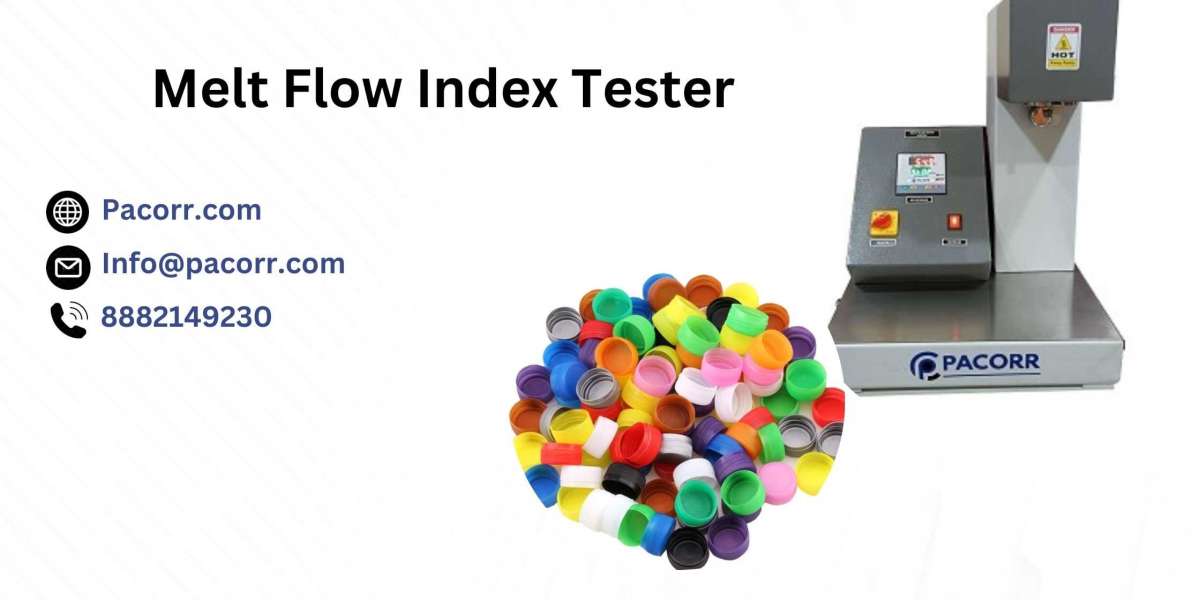What is a Melt Flow Index Tester?
A Melt Flow Index Tester is a device used to measure the melt flow rate (MFR) of thermoplastic polymers. The MFR indicates how easily a polymer can flow when melted, which directly relates to its processability and quality. The Melt Flow Index (MFI) is typically expressed in grams per 10 minutes (g/10 min).
Working Principle of the Melt Flow Index Tester
The Melt Flow Index Testing operates by heating a sample of the polymer to a specific temperature until it melts. The molten polymer is then forced through a capillary die of a specific diameter under a pre-defined load. The amount of polymer extruded over a set period is measured and recorded as the MFI
Preparation: A specific amount of polymer sample is placed in the barrel of the tester.
Heating: The sample is heated to a precise temperature, according to the material's testing standard (e.g., ASTM D1238 or ISO 1133).
Extrusion: A weighted piston applies pressure to the melted polymer, pushing it through the capillary die.
Measurement: The extruded polymer is collected and weighed, and the MFI is calculated.
Importance of Melt Flow Index Testing
- Quality Control
The Melt Flow Teste is a critical parameter in quality control processes. By regularly testing the melt flow rate, manufacturers can ensure that their materials meet the required standards and specifications. Any deviation from the expected MFI can indicate issues in the polymer production process, such as changes in molecular weight or composition.
- Process Optimization
Knowing the MFI helps in optimizing processing conditions during manufacturing. For instance, materials with different MFIs may require adjustments in processing temperatures, screw speeds, or Mold designs to achieve the best results.
- Material Selection
When selecting materials for specific applications, the MFI provides valuable insights into their behaviour during processing. For example, polymers with a high MFI are typically used in injection moulding, while those with a lower MFI are suitable for extrusion processes.
- Consistency and Performance
Maintaining a consistent MFI across production batches ensures that the final products have uniform properties and performance. This consistency is vital for applications where precise material characteristics are crucial, such as in automotive or medical industries.
Applications of Melt Flow Index Testing
- Plastics Manufacturing
In plastics manufacturing, the Melt Flow Index Tester Price is used to monitor the quality of raw materials and finished products. It helps manufacturers maintain consistent product quality and optimize their production processes.
- Polymer Compounding
In polymer compounding, different additives are mixed with base polymers to achieve desired properties. The MFI Tester helps in determining the flow characteristics of the compounded material, ensuring it meets the required specifications.
- Research and Development
In RD, the MFI Tester is used to study the behaviour of new polymer formulations. It provides insights into how different compositions and additives affect the flow properties of polymers, aiding in the development of new materials with specific characteristics.
- Regulatory Compliance
Many industries have stringent regulatory requirements regarding the properties of polymer materials. The MFI Tester helps manufacturers ensure their products comply with these standards, avoiding costly penalties and recalls.
Choosing the Right Melt Flow Index Tester
When selecting an Melt Flow Index Tester, several factors should be considered:
Temperature Range: Ensure the tester can handle the temperature requirements of your specific polymers.
Load Options: Different polymers require different loads for testing. Choose a tester that offers the necessary load options.
Precision and Accuracy: High precision and accuracy are crucial for reliable MFI measurements.
Ease of Use: Look for a user-friendly interface and automated features to simplify the testing process.
Compliance: Ensure the tester complies with relevant standards such as ASTM D1238 or ISO 1133.
Conclusion
The Melt Flow Index Testing is an essential tool in the polymer industry, providing valuable data for quality control, process optimization, material selection, and regulatory compliance. By understanding and utilizing this instrument, manufacturers can ensure the production of high-quality, consistent, and reliable polymer products. Investing in a reliable MFI Tester, like those offered by Pacorr Testing Instruments, can significantly enhance your polymer testing capabilities and contribute to the overall success of your manufacturing processes.
For more information on Melt Flow Index Tester and other polymer testing equipment, visit Pacorr Testing Instruments.
FAQ: Melt Flow Index Tester
- What is a Melt Flow Index Tester?
A device used to measure the melt flow rate (MFR) of thermoplastic polymers, indicating how easily they flow when melted.
- Why is the Melt Flow Index important?
It ensures quality control, aids in process optimization, helps in material selection, and maintains consistency in polymer products.
- How does a Melt Flow Index Tester work?
The tester heats a polymer sample until it melts and then extrudes it through a capillary die under a specific load. The extruded amount over a set period is measured as the MFI.
- What standards are used for MFI testing?
Common standards include ASTM D1238 and ISO 1133.
- How is the Melt Flow Index used in quality control?
It monitors the consistency of polymer batches, ensuring they meet required specifications and detecting deviations in production.
- What are the applications of the Melt Flow Index Tester?
Applications include plastics manufacturing, polymer compounding, research and development, and regulatory compliance.
- How do I choose the right Melt Flow Index Tester?
Consider temperature range, load options, precision, ease of use, and compliance with relevant standards.
- Where can I get more information or support?
Visit the Pacorr Testing Instruments website for more information and support.








